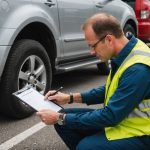Purchasing a vehicle is a significant decision, and for many in the UK, the allure of buying a used car at a reduced price is tempting. However, when considering a vehicle with a history of accidents, you must tread carefully. Cars that have sustained damage in the past can come with a host of potential risks that may not be immediately apparent. This article delves into these risks, offering insight and guidance for those contemplating such a purchase, ensuring you are informed and prepared every step of the way.
Understanding Vehicle History Reports
Before deciding whether to buy a car with a past riddled with accidents, the first step is to meticulously review its vehicle history report. This report is your gateway to understanding any previous damage the car might have suffered, the extent of the repairs, and other key data points that could influence your buying decision.
Also read : What steps should be taken to ensure a vehicle purchase is fraud-free in the UK?
What Information Does a Vehicle History Report Provide?
The vehicle history report is a comprehensive document that outlines significant events in the car’s past, including:
- Accident History: Details about past accidents, including dates and locations.
- Title Information: Whether the car has a “salvage title,” indicating it was deemed a total loss by an insurance company.
- Repair Records: Documentation of repairs carried out post-accident.
- Ownership History: Number of previous owners, which can indicate how well the car has been maintained.
Having access to this information can help you make an informed decision about the vehicle’s true condition, potentially saving you from unforeseen expenses and repairs.
This might interest you : How can fleet management companies in the UK reduce their carbon footprint?
Potential Limitations of Vehicle History Reports
While these reports are invaluable, they are not foolproof. Some accidents might not be reported to insurance companies, meaning they won’t appear in the report. Therefore, a thorough inspection by a trusted mechanic is vital to uncover any hidden damage not documented.
In essence, a vehicle history report should serve as a starting point for further investigation. Armed with this knowledge, you can approach the seller with confidence, equipped to negotiate or walk away if necessary.
The Impact of Accident History on Vehicle Value
One of the most significant concerns when considering a car with a history of accidents is its potential impact on the vehicle’s price and resale value. Cars that have sustained significant damage can lose a substantial part of their market worth, making it crucial for buyers to weigh the financial implications.
How Accident History Affects Resale Value
When a vehicle has been involved in an accident, it typically results in a lower resale value. Here’s why:
- Buyer Perception: Future buyers may be wary of a car with past damage, fearing lingering issues despite repairs.
- Market Depreciation: Cars with accident histories often have diminished market appeal, resulting in lower demand and reduced value.
- Insurance Costs: Some insurance providers may view these vehicles as high risk, leading to increased premiums.
Negotiating the Price
When negotiating with a seller, use the vehicle history report as leverage. If the car has been in an accident, you might persuade the seller to reduce the price to account for potential risks and future maintenance needs.
Considering Long-Term Ownership
If you plan to keep the car long-term, a lower purchase price might offset the reduced resale value. However, be prepared for potential repairs and maintenance needs that could arise due to the vehicle’s accident history.
Safety Concerns and Mechanical Integrity
Safety should always be a top priority when buying a vehicle, especially one that has experienced previous damage. A car that’s been in an accident may have compromised its mechanical integrity, even if it appears in good condition externally.
Assessing Safety Risks
- Structural Damage: Accidents can cause structural issues that may not be immediately evident but can affect safety.
- Airbag Deployment: Check if airbags were deployed and replaced properly, as improper reinstallation poses serious risks.
- Alignment and Suspension: Past accidents can lead to alignment problems, affecting handling and tire wear.
Ensuring Proper Repairs
When considering a vehicle with a history of damage, ensure that all necessary repairs have been conducted by certified professionals. Ask for detailed repair records and consult with a trusted mechanic to verify the quality and thoroughness of the work done.
The Importance of a Professional Vehicle Inspection
To truly understand the condition of a vehicle with a past accident, a professional inspection is non-negotiable. A trained eye can spot potential issues that might be missed by an untrained observer, ensuring that you’re aware of any lingering safety concerns before completing a purchase.
Evaluating the Seller’s Credibility
Another crucial aspect to consider when buying a car with a history of accidents is the credibility of the seller. A trustworthy seller will provide transparent information and support you in making an informed decision.
Identifying a Reputable Seller
- Transparency: A credible seller will offer complete access to the vehicle’s history and any past repairs.
- Credentials: Check if the seller is a registered dealer or private seller with a credible reputation.
- Reviews and References: Look for reviews from previous customers or ask for references to gauge the seller’s reliability.
Questions to Ask the Seller
- “What is the history of accidents this vehicle has experienced?”
- “Can you provide detailed repair records and invoices?”
- “Why are you selling this car?”
Protecting Yourself Against Potential Pitfalls
- Written Agreements: Ensure all verbal promises are included in a written agreement to avoid misunderstandings.
- Documentation: Keep detailed records of all transactions, communications, and inspections.
By thoroughly evaluating the seller, you safeguard yourself from potential discrepancies and ensure a transparent purchasing process.
Purchasing a car with a history of accidents in the UK demands vigilance, thorough research, and an understanding of the potential risks involved. While such vehicles can offer financial advantages in terms of lower purchase prices, they also come with challenges related to safety, mechanical reliability, and resale value.
By equipping yourselves with a comprehensive vehicle history report, conducting a professional inspection, and evaluating the credibility of the seller, you can make a more informed decision. Ultimately, the onus is on you to weigh the benefits against the risks and decide whether buying a car with a past accident is worth the potential challenges. Remember, being informed is your best tool in navigating this complex terrain.
Purchasing a car is a significant investment, and many of you are aware of the importance of thorough research before making such a commitment. One aspect that often raises concern is the vehicle’s history. Specifically, when a vehicle has been involved in an accident, it can significantly influence the decision to buy. In this article, we’ll delve into the risks associated with buying cars that have been in accidents, offering insights and guidance to help you make informed choices.
Understanding the Vehicle’s Accident History
Before diving into the intricacies of the risks, it’s crucial to comprehend what constitutes a vehicle‘s history. When a car has been involved in an accident, its details are systematically recorded. This report includes the nature of the damage, the extent of the repairs, and whether the title of the car has been marked as salvaged or rebuilt.
The Importance of a Detailed Report
A comprehensive report is not just a document; it is a window into the car‘s past. This information is vital for you to gauge potential long-term impacts and costs involved. Without this report, you could be blindsided by underlying issues that are not immediately apparent.
Key Elements to Check
- Damage assessment: Not all damages are equal. Some might be cosmetic, while others could affect the structural integrity of the vehicle.
- Repairs undertaken: See which parts have been replaced or repaired to understand if these changes meet safety standards.
- Seller disclosures: Ensure that the seller provides all relevant information without holding back crucial details.
Why It Matters
Understanding these elements can save potential buyers from future hassles. A vehicle with a transparent history could still be a viable purchase if repairs were done efficiently, maintaining safety and performance standards.
Financial Implications of Buying Accident-Damaged Cars
Purchasing a vehicle that has been in an accident can have several financial repercussions. These effects can manifest in different forms, from immediate out-of-pocket expenses to long-term fiscal responsibilities.
The Price Tag
Buyers may notice a reduced initial price for cars with an accident history. While this might seem like a bargain, it is essential to remember that the lower price can be deceptive. The cost of repairs, potential insurance hikes, and diminished resale value can add up over time.
Insurance Costs
Insurance companies tend to raise premiums for vehicles with past damage. The logic here is simple: an accident-damaged car might be more prone to mechanical failures, thus posing a higher risk for insurers. Before you buy, it’s prudent to check how the vehicle‘s history might affect your insurance rates.
Future Repairs and Maintenance
Vehicles that have undergone significant repairs may experience unforeseen issues down the line. While parts might be replaced, the original integrity sometimes can’t be fully restored. This leads to increased wear and tear and might necessitate more frequent repairs.
Resale Value
Finally, consider the potential resale value. Cars with an accident history generally command a lower resale price. This depreciation should factor into your long-term financial planning, especially if you intend to sell the car in the future.
Safety Concerns and Structural Integrity
When considering a vehicle with a history of accidents, safety is of paramount importance. The structural integrity and overall condition of the car can be significantly compromised post-accident, which may pose risks to you and other passengers.
Assessing Damage
After an accident, a car’s structural components can be severely affected. This includes the frame, steering system, and airbags—all crucial for safety. Even if repairs have been done, it’s vital to verify that they adhere to stringent safety standards.
Professional Inspections
Hiring an independent mechanic to inspect the vehicle can provide peace of mind. A professional can identify potential issues overlooked during initial repairs and give a reliable assessment of the car‘s current condition.
Why Safety Matters
Safety is not just about compliance with laws but ensuring the well-being of everyone in the vehicle. A compromised vehicle heightens the risk of injury or fatality in the unfortunate event of another accident. Buyers should never underestimate the importance of a vehicle‘s safety profile.
Legal and Ethical Considerations
Purchasing a car with a history of accidents in the UK also involves navigating legal and ethical territories. Understanding your rights and responsibilities can aid in making a sound buying decision.
Your Rights as a Buyer
Under UK consumer law, you are entitled to full disclosure of a vehicle‘s history from the seller. This information is crucial as it empowers you to make an informed decision.
Ethical Obligations of Sellers
Sellers are legally bound to divulge details about any significant repairs or accidents that the vehicle has undergone. Failure to do so can lead to legal repercussions. As buyers, insist on transparency and avoid deals that seem too good to be true.
Importance of a Written Agreement
A written agreement protects both parties, ensuring that all aspects of the sale, including the history of the vehicle, are documented. This can be a critical component if disputes arise later regarding the car‘s condition.
Staying Informed
Staying informed about your legal rights and ensuring ethical practices can shield you from potential pitfalls. It is always advisable to conduct due diligence and perhaps seek legal advice if uncertainties arise.
Buying a vehicle with an accident history in the UK involves navigating a minefield of potential risks. From financial implications and safety concerns to legal and ethical considerations, each aspect requires careful evaluation. As buyers, it’s paramount to approach such purchases with a discerning eye and a clear understanding of what you’re entering into. A thorough investigation into the vehicle‘s history, a professional inspection, and a firm grasp on legal rights will aid in making a well-informed and confident decision. By recognizing the intricacies involved, you can mitigate risks and ensure your investment is sound and secure.











